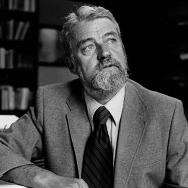During the pandemic, English professors Edgar Garcia and Timothy Harrison began to notice connections between two seemingly different texts also written in moments of crisis.
John Milton’s epic “Paradise Lost” was written after the English Civil War once the poet had lost his vision. The “Popol Vuh”—sometimes called “the Mayan Bible”—was written by Maya scholars while living under Spanish colonization and forced religious conversion.
Both tell creation stories, narratives about how the world and its inhabitants formed. And both were written within the same historical moment—though on either side of the Atlantic.
In “Creations: Popol Vuh and Paradise Lost,” the two scholars combined expertise for an experimental graduate course this Spring Quarter comparing the two texts, not just as works of literature, but also as two pieces of the trans-Atlantic world puzzle.
“Thinking through ‘Paradise Lost’ and ‘Popol Vuh’ together has helped me to see, with a finer focus, that creations always happen in historical time,” said Garcia, who recently published a book of essays on the “Popol Vuh.” “They don't happen out of nothing.”
At the heart of the course is comparison, which for Garcia and Harrison is mirror-like—helping to unpack our own ideas about what we know.
“You don't realize the presuppositions and assumptions you carry with you about what things mean until you put it into dialogue with something,” said Harrison, who is currently writing a book about Milton’s later poems.
Esmé Nandorfy-Fischlin, a second-year Divinity School student, says the professors’ approach has an “exciting improvisational quality.”
“I always come out of class with so many more notes than I could have spoken,” Nandorfy-Fischlin said. “I feel so alive in that class.”
Comparing the incomparable
The “Popol Vuh”, or “Popol Wuj,” is a sacred text that recounts the creation story of the K’iche’ Maya, a group indigenous to modern-day Guatemala.
The sweeping epic details how the Creators formed the Earth and filled it with plants and animals. It also recounts the tales of the Hero Twins—Hunahpú and Xbalanqué—and the Creators’ many attempts to form human beings.
Though many versions of the “Popol Vuh” have been passed on—spoken in prayers, woven into textiles and painted onto pottery—there is only one written copy.
Sometime in the mid-16th century, a group of one or more Maya scholars wrote the “Popol Vuh” under the threat of religious conversion. Around 1702, Dominican missionary Father Francisco Ximénez copied that version, written in Latinized K’iche’, and also translated it into Spanish. It’s this version that now sits in Chicago’s Newberry Library.
“The text that arrives to us is very complicated, because it is put to paper in a colonial project of converting the Mayas,” García said.
Despite this context, the “Popol Vuh” remains foundational to Mesoamerican history and contemporary Latin American identity. Though it has only recently gained wider recognition by traditional Western institutions.
In contrast, Milton’s “Paradise Lost” has long been considered a literary masterpiece.
John Milton, an intellectual and poet, wrote during a time of major upheaval in England. His political writings against censorship and tyranny were controversial at the time. Milton published “Paradise Lost,” an epic poem written in blank verse, in 1667.
Experimental and radical when first published, the poem borrows many stories from the Christian Bible like the temptation of Adam of Eve by the fallen angel Satan.
“Paradise Lost and the Popol Vuh are both works that are confronting moral and historical loss,” Harrison said.
“Productive bewilderment”
At the outset, both professors wanted to create a model for comparison. But perhaps the biggest takeaway has been their method of teaching.
“It's a super democratic space,” Nandorfy-Fischlin said. “They're really bringing us all into their dialog and we're all doing the work of experimentation together.”
Each week, students in the “Creations” course compare a different element of the two texts. One week they discuss Underworlds, the next they compare the use of language. This method, which Garcia and Harrison call “part to part” comparison, isn’t trying to get at some overarching big idea.
“We want to read the one through the other, so that you’re in a state of productive bewilderment,” Harrison said. “So you can arrive at a moment where you don’t understand the thing you thought you understood.”
This means the professors and students alike are often discussing parallels and ideas for the first time. Harrison calls this a “performance of non-mastery,” which Garcia says makes the class feel “radically open.”
“Students get to see us think on our feet across respective literary objects and historical traditions,” Garcia said. “And feel like they can be a part of that.”
"They're staging for us this ability to engage in comparative work without needing to be an expert in both texts” Nandorfy-Fischlin said. “That mastery is not a precondition for being able to participate is a model of what classes should be.”

